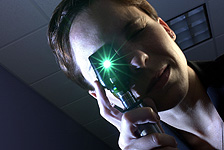Having Difficulty Seeing at Night?
Do you find it difficult seeing while driving at night or reading in a dimly lit room? You most likely have nyctalopia, also known as night blindness.
Read MoreSmoking and Glaucoma
We all know smoking impacts our general health, but did you know it can also affect the eyes? More than 1 billion people worldwide smoke
Read MoreDiabetes: Why You Shouldn’t Skip Your Eye Exams
Annual eye exams can prevent 95 percent of vision loss. Diabetes affects around 10 percent of the American population, yet nearly 60 percent of people
Read MoreWhy Am I Seeing Halos?
Seeing halos around lights can be a cause for concern, or it can be completely normal. If you notice a sudden appearance of halos or
Read MoreWhat’s Worse: High Myopia or Smoking?
Smoking can lead to the development of sight-threatening eye diseases — but did you know that myopia can also increase your risk of these serious
Read MoreShould I Be Worried About Myopia?
Myopia (nearsightedness) progression in children doesn’t only result in needing stronger glasses, but also leads to serious sight-threatening eye conditions. Below are the most common
Read MoreCan Your Child Benefit from Myopia Management?
According to studies, myopia management has shown to reduce myopia progression by up to 78%. Myopia management is a treatment program that involves multifocal glasses or contact lenses, overnight ortho-k lenses, MiSight lenses, or specialized eye drops— all scientifically proven to reduce the rate of myopia progression and the risk of future eye diseases associated with myopia.
Read MoreLight Sensitivity (Photophobia)
Light sensitivity is one of the most common visual complaints. Light sensitivity, clinically termed photophobia, can cause discomfort in the presence of natural and artificial
Read MoreCan Steroids Affect Vision?
While steroids are a commonly prescribed treatment, they must be taken with caution as they can also produce certain side effects that can affect your eyes and vision. Corticosteroid drugs, also called steroids, stimulate the production of cortisol in the body. Cortisol is a natural hormone that helps to stabilize the body’s anti-inflammatory response system, and maintain immune function and blood pressure. Doctors typically prescribe steroid drugs to reduce any type of inflammation in the body, including eye inflammation.
Read MoreNight Blindness: Treatments and Prevention
Night blindness (nyctalopia) affects vision clarity in low light conditions and can significantly impact performance of daily activities. Night blindness, despite its name, does not
Read MoreWhat Causes Night Blindness?
Night blindness (nyctalopia) causes reduced vision in low light conditions, and can be a source of fear and anxiety for those affected by it. Decreased
Read MoreCataract FAQs
The top 12 questions by patients to their eye doctors on cataracts.
Read MoreWhen Should I Have Cataract Surgery?
Over 50% of all adults will begin to develop a cataract by the time they reach 60. When cataracts first develop, you may not even notice any changes to your vision. However, as cataracts worsen, the clouding effects on your eye’s lens increases in severity, and blurry or distorted vision will begin to affect your performance of daily activities
Read MoreWill Cataract Surgery Give Me 20/20 Vision?
How does cataract surgery help to improve vision? As cataracts develop and cloud the eye’s natural lens, significant visual distortions begin to impact the ability
Read MoreCan I Prevent Cataracts Naturally?
The good news is there are steps you can take to help reduce your risk of cataracts, or at least delay their onset. There is no scientific proof that cataracts can be prevented entirely, unfortunately, as we age, cataracts are simply inevitable.
Read MoreGuide to Sunglasses
Sunglasses are fashionable, but why are they so important? Most people are aware of the harmful effects ultraviolet (UV) radiation can have on the skin. However, many are unaware that UV radiation can also endanger our ocular health and vision.
Read More














